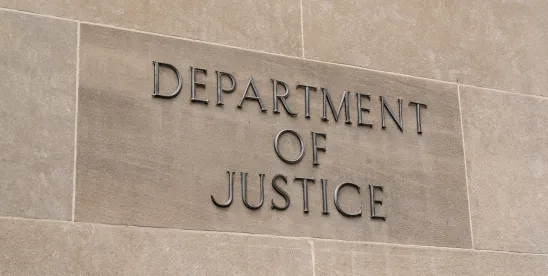On December 6, 2024, Principal Associate Deputy Attorney General Marshall Miller provided an update on the Justice Department’s (DOJ) corporate criminal enforcement efforts during his keynote address at the Practicing Law Institute’s White Collar Crime 2024 Program. Among other topics, Miller addressed ongoing efforts to combat corporate crime using self-disclosure policies and whistleblower programs when he said, “We’ve given good actors more avenues to help us go after the bad guys – through innovative whistleblower programs and consistent, transparent, and predictable voluntary self-disclosure policies. And we’ve made clearer than ever before what we expect from companies cooperating with government investigations to accelerate investigations of wrongdoers.”
In the speech, Miller touted the DOJ’s recent successes securing convictions of numerous individuals, including “the CEOs of the world’s two largest cryptocurrency platforms – FTX and Binance; the CEO and COO of Theranos; the founder and the CFO of Archegos; two senior executives of Goldman Sachs; and dozens of other high-ranking executives across a range of industries.” In addition, Miller reiterated the continuing focus on whistleblowers and voluntary self-disclosure policies, asserting that the DOJ had “clarified the rules of the road” on those topics. Miller highlighted the similarities between voluntary self-disclosure policies and whistleblower programs, noting “for the first time as of August 2024, DOJ has instituted a Department-led whistleblower program with clear incentives for dropping a dime on corporate crime.”
We previously detailed the new DOJ whistleblower reward program here. That program is designed to focus on four subject matter areas: 1) violations by financial institutions, their insiders and agents involving money laundering, fraud, and fraud against or non-compliance with regulators; 2) foreign corruption and bribery and violations of money laundering statutes; 3) domestic corruption violations including bribes and kickbacks paid to domestic public officials; and 4) healthcare offenses involving private or non-public healthcare benefit programs and fraud against patients, investors or other non-governmental entities in the healthcare industry, or other violations of federal law not covered by the federal False Claims Act. In his speech, Miller noted that whistleblower programs do not exist in a vacuum – “[r]ather, they fill in the gaps and build on effective existing models employed in SEC, CFTC, FinCen and False Claims Act cases.”
A full understanding and effective application of the new whistleblower reward program may increase a company’s chances of avoiding a guilty plea or indictment. Under the program “a voluntary self-disclosure to the Criminal Division can also qualify a company for the presumption of a declination of prosecution.” Miller emphasized the “significant results” the program has yielded, including steady increases in voluntary self-disclosures – in fact, last year’s numbers doubled those from 2021. Miller also pointed to the DOJ’s receipt of over 250 whistleblower tips, “many which appear to identify criminal conduct we didn’t know about.” Miller also referenced a U.S. Attorneys’ Offices report that individual voluntary self-disclosures have resulted in “promising ongoing investigations,” but did not provide details regarding the number or nature of such cases.
Miller also discussed recent updates to the DOJ’s guidance on evaluating corporate compliance programs. Although the DOJ’s guidance doesn’t tell companies how to design and implement their compliance programs, it identifies four questions the DOJ expects executives and board members to ask in assessing the compliance program’s efficacy:
- Have we empowered our compliance leaders and invested sufficiently in our compliance program, given our risk profile and today’s geopolitical landscape?
- Do we have effective internal detection and reporting systems and robust internal investigative capabilities, so we can avail ourselves of voluntary self-disclosure opportunities?
- Have we designed compensation systems that promote compliance and enable clawbacks or escrowing of incentive comp?
- Have we assessed risks associated with national security and emerging technologies and taken appropriate steps to mitigate them?
In Miller’s view, “if a company finds itself on the wrong side of a DOJ investigation tomorrow, the company’s posture may well depend on how its leadership answers those questions today.”
While the above four questions are helpful to guide compliance program self-evaluations, self-disclosure determinations typically require a more holistic assessment. In that context, companies who identify potential violations must be able to swiftly gauge whether to self-disclose potential violations and, as part of that effort, assess whether to cooperate or otherwise act to accelerate the government’s investigation. Such decisions must be made quickly, underscoring the need for companies to have at least a framework in place before the fact, and to consult attorneys experienced in making self-disclosures and in working with the government throughout that process. In this context, determining which choice best aligns with the company’s interests is seldom a simple calculus.






 />i
/>i

